

ADC conjugate. Creative Biolabs has over a decade of working experience in antibody design and modification to fit various bio-conjugation strategies, especially for the development of antibody-drug conjugates (ADCs).
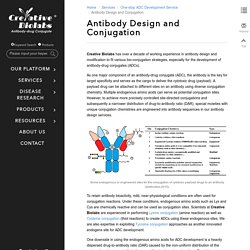
As one major component of an antibody-drug conjugate (ADC), the antibody is the key for target specificity and serves as the cargo to deliver the cytotoxic drug (payload). A payload drug can be attached to different sites on an antibody using diverse conjugation chemistry. Multiple endogenous amino acids can serve as potential conjugation sites. Adc analysis. Empowered by our advanced high-resolution analytical platforms and experienced technical personnel, the analytical division at Creative Biolabs is fully competent and dedicated to serve as your one-stop-shop for ADC in vitro analysis and characterizations.
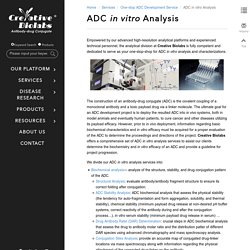
The construction of an antibody-drug conjugate (ADC) is the covalent coupling of a monoclonal antibody and a toxic payload drug via a linker molecule. The ultimate goal for an ADC development project is to deploy the resulted ADC into in vivo systems, both in model animals and eventually human patients, to cure cancer and other diseases utilizing its payload efficacy. However, prior to in vivo deployment, information regarding basic biochemical characteristics and in vitro efficacy must be acquired for a proper evaluation of the ADC to determine the proceedings and directions of the project. We divide our ADC in vitro analysis services into: Case Study. Adc. Monoclonal antibody-based immunotherapies against cancer and other infectious diseases are highly advantageous comparing to conventional therapeutic approaches due to their high specificity and affinity towards well-defined targets.
Antibody-drug conjugates (ADCs) inherit such superiorities and more remarkably, expand the therapeutic window of the conjugated drugs (payloads), which are usually highly toxic and diverse in their biochemical nature. ADC mode of action. ADC molecules travel to the tumor site via systematic circulation, bind to tumor surface antigens, and enter the tumor cells via receptor mediated endocytosis (internalization). The payload is released in the cytosol or lysosome to eliminate the cancer cell by disrupting important cellular pathways (microtubule assembly, DNA transcription, mRNA processing…). Three major components define an ADC—the monoclonal antibody, a cytotoxic payload, and a molecular linker that covalently bridges the other two components. Case Study. Engineered T cell receptor. CellRapeutics™ TCR Technology Altering the specificity of T cell receptor (TCR) is one of the popular strategies to genetically modify T cells to enhance the tumor-killing activity of T cells.
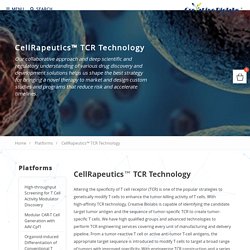
With high-affinity TCR technology, Creative Biolabs is capable of identifying the candidate target tumor antigen and the sequence of tumor-specific TCR to create tumor-specific T cells. We have high qualified groups and advanced technologies to perform TCR engineering services covering every unit of manufacturing and delivery pipeline.
CAR-T Cytokine. Based on the outstanding expertise and extensive experience, Creative Biolabs has specially developed a systematic approach of multiplex cytokine and chemokine assays for research and clinical purposes.
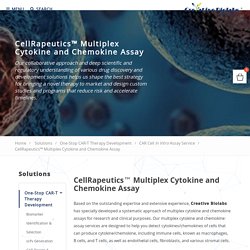
Our multiplex cytokine and chemokine assay services are designed to help you detect cytokines/chemokines of cells that can produce cytokine/chemokine, including immune cells, known as macrophages, B cells, and T cells, as well as endothelial cells, fibroblasts, and various stromal cells. Introduction of Cytokine and Chemokine Cytokines are a wide class of small proteins that play a role in various cell signaling especially in paracrine signaling, autocrine signaling, and endocrine signaling as immunomodulating agents. Their release affects the behavior of cells around them. CAR-T platform. As a leading technology provider, Creative Biolabs has established CellRapeutics™ Chimeric Antigen Receptor (CAR) Technology platform.
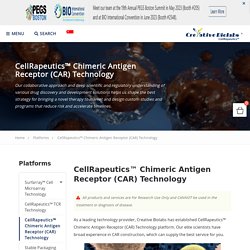
Our elite scientists have broad experience in CAR construction, which can supply the best service for you. scFv Production in CAR Technology The typical structure of a CAR molecule includes a single chain variable fragment (scFv), a spacer, a transmembrane domain (TM) and an intracellular signaling domain. The scFv is derived from monoclonal antibody (mAb), which can specifically recognize the target protein on tumor surface and subsequently transduct activation signal into CAR-T cell.
With our one-stop solution, we can carry out scFv generation from hybridoma cell line (full length of monoclonal antibody) through the converting full immune globulin (monoclonal antibodies) into a scFv using a short flexible linker or phage display library which has nearly 1.0 × 108 individual candidate clones. T cell assays. CAR-T Preclinical In Vivo Assay Taking advantage of the CellRapeutics™ platform, Creative Biolabs provides customized, standardized, reliable and high-quality CAR-T preclinical in vivo assay services for clients across the world.
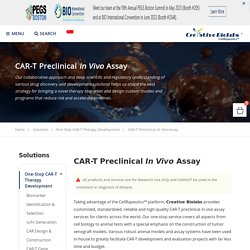
Our one-stop service covers all aspects from cell biology to animal tests with a special emphasis on the construction of tumor xenograft models. CAR-T for Glioma. CAR Targeting Other Cancers and Viral Infection Besides the main categories of cancer such as Leukemia, Lymphoma, Carcinoma, Sarcoma, Blastoma and Germ cell tumors, Creative Biolabs also provides world class CAR products targeting other cancers like Glioma, tumor vasculature and even viral infection like CMV or EBV, etc,.
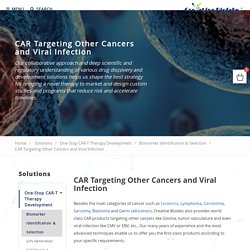
Our many years of experience and the most advanced techniques enable us to offer you the first-class products according to your specific requirements. Glioma is a kind of tumor which arises from glial cells in brain or spine. It can be divided into many types including Ependymomas, Astrocytomas, Oligodendrogliomas, Brainstem glioma, Optic nerve glioma and mixed gliomas. Benefiting from our broad experience in constructing CARs against various glioma antigens, we can offer you the best service. Tcr engineering. Tcr. T cell development. Chimeric antigen receptor technology. Chimeric antigen receptor t cell. Chimeric antigen receptor. CAR-t technology. Tcr t. Chimeric antigen receptor therapy.